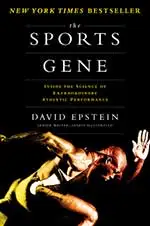
Can genetics predict your child’s future in sports?
Are some kids predisposed to become great athletes because of a hidden “sports gene”? The answer is complicated. It’s yes, no, kind-of-sort-of but not-really.
In his New York Times-bestselling book The Sports Gene, author David Epstein reports on today’s cutting-edge genetics research and recounts anecdotal evidence from around the globe to reveal the role that genes play in making an athlete.
From discussing Kenyan dominance in distance running, Jamaican superiority in sprinting, inordinately elevated hemoglobin in Finnish cross-country skiers, pain tolerance in NFL linebackers, and much more, a complex picture emerges in Epstein’s well-researched book.
Is it simply about having the right genes from birth? Or can any kid become a world champion in any sport with enough hours of training?
While the optimal mix of nature (genes) versus nurture (training and environment) varies between sports, the general pattern is that athletic talent is a mix of both.
Some readers may be surprised by that conclusion, but most experienced coaches won’t be.
Epstein’s book is timely because much of the recent talk about athletic talent has focused on the influence of training, which falls squarely into the nurture camp. With his 2008 book Outliers, author Malcolm Gladwell helped to popularize the notion of the 10,000 hour rule – an idea first put forward by talent researcher K. Anders Ericsson in the early 1990s. Based on his research into the total hours required to become a concert violinist, Ericsson postulated that anyone who accumulated 10,000 hours of practice could develop expert talent.
The Sports Gene:
Inside the Science of Extraordinary Athletic Performance

Author: David Epstein
Published by: Current Hardcover / Current Trade
Pages: 352
Format: Hardcover and paperback
Price: $28.50 hardcover; $19.00 paperback
Simple and engaging, the implications of this book extend far beyond the world of sport and physical activity
(It’s unclear whether or not Ericsson ever intended his statements to be extended to all areas of human endeavor, but Gladwell’s book certainly helped to spread the notion that training was the only thing anyone needed in any field.)
Epstein, a senior writer for Sports Illustrated, also recognizes the importance of practice and training in sport, but he goes further to show the role that genes play in producing the “talent” of a world champion.
He uses one particular story as a stark example of the power of nature and nurture in athlete development. He tells of two world champion high jumpers who came from opposite ends of the nature and nurture spectrum to dominate their event.
Stefan Holm of Sweden trained for nearly two decades in high jump, and then he won Olympic gold at Athens 2004. His years of practice made him the perfect poster child for the 10,000-hour rule.
Then Holm was decisively beaten at the 2007 World Championships in Osaka. By someone who had practiced for only eight months.
Despite being new to high jump and having relatively poor technique, Donald Thomas of the Bahamas basically beat Holm with raw athleticism. As researchers determined afterwards, Thomas’ athletic physique included unusually long Achilles tendons that stored extraordinary amounts of energy for jumping. And he acquired his Achilles tendons by way of his genes, not training.
Not every sport can provide such a startling example of the contrast between nature and nurture. For the most part, the stories about athletes in The Sports Gene show that a mix of genes and training is almost always required to become a world champion.
The crux of the discussion comes down to whether or not we can actually predict talent based on genetic testing for “the right genes”. At this point in time, says Epstein, the answer is still “no”, and it looks likely to remain that way for the foreseeable future.
Epstein points out that dozens of genes are implicated simply in determining your height. And as with just about any physical trait, you might have a few of the genes, or you might have a lot of them. From there, it becomes a question of whether or not these genes are expressed. Depending on your environment and interactions with other genes in your personal collection of approximately 23,000 genes, the particular genes in question might be switched on or switched off.
In light of this complexity and unpredictability, says Epstein, if you want to test for height, it makes more sense simply to use a tape measure, or look at the height of a child’s parents. Speed testing is the same. A stopwatch is still a more reliable test than drawing blood and looking for one of a few dozen genes that may determine how fast you can sprint.
In the end of the day, when we play sports, Epstein says we should just enjoy the ride and see where it takes us.
“Everyone benefits from exercise or sports practice in some unique way,” writes Epstein. “To take part is a journey of self-discovery that, largely, is beyond even the illuminating reach of cutting-edge science.”
What does this mean for our kids as they pursue sports and physical activity? In a recent interview with CBC radio’s Quirks and Quarks, Epstein provided some counsel for parents (he was also interviewed on camera by CBC reporter Paul Hunter).
“I would advise sports sampling from an early age, instead of this hyper-specialization that we’re moving toward,” said Epstein. “All of the sports science shows that the vast majority of elites have a sports sampling period up to about age 12 or 13 before they focus in, and it’s a shame that we’re moving away from that.”
If you have even a remote interest in genetics and human physiology, you will likely find much pleasure and fascination in reading The Sports Gene. The implications of the book extend far beyond the world of sport and physical activity, and Epstein’s simple, lucid and engaging style will help even casual readers to enjoy exploring the essentials of human genetics.





